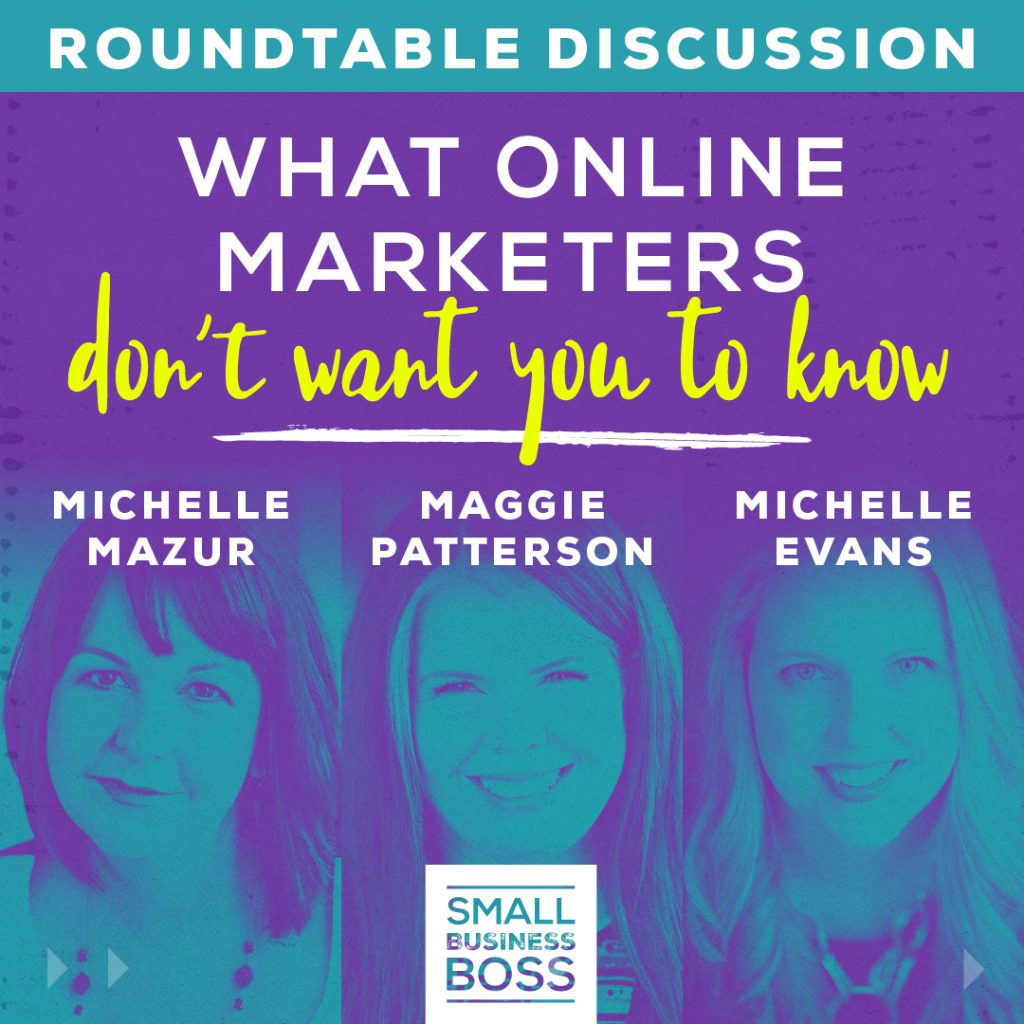
Episode 200: What Online Marketers Don’t Want You To Know
This is a very special episode of the Small Business Boss podcast because it’s episode 200 of the show.
I had no idea when I set out on this journey of podcasting six years ago (special shout out to my friends who’ve been with me since my Marketing Moxie days!) that it would bring me so many friendships, so many amazing connections through guests, so many awesome listeners and I want to thank each and every one of you for letting me in your head and your ears week in, week out.
When it comes to running an online business, it’s nearly impossible to avoid the never-ending barrage of sleazy dude-bro marketers and the glossy leather pant clad coaches that are full of empty promises.
For the 200th episode of the Small Business Boss podcast, I’m doing a very special roundtable episode, taking a hard look at their claims and the way the market is shifting. There are also a few confessions along the way with my special guests.
For this roundtable, I invited two guests — Michelle Evans and Michelle Mazur who are both experienced business owners and marketing pros, plus they’re good friends. They both have a strong viewpoint on what’s wrong with online marketing including what’s working and what’s not. What I love about both of them is their willingness to call out what’s wrong and talk about where we need to think differently.
Michelle Evans runs a digital marketing agency where they do Facebook ads and handle all sorts of different marketing. She’s the creator of the Profit Without Worry podcast and she comes from a very long corporate history. Having worked at Microsoft for years, she really has been there and done that.
Dr. Michelle Mazur is the creator of the Three Word Rebellion and the host of the Rebel Rising podcast. Michelle specializes in messaging and brings a very different perspective. As she has a doctorate in communications, she’s a master at looking at the tactics people are using, breaking them down and providing an alternative.
In this episode, we’re also sharing some of our own epic fails (like the very first course I sold) and lessons about building a business that works for you as well as how not to get freaked out when things aren’t working.
Let’s dive in!
The State of Online Marketing
- The playing field for online marketing has leveled out to some degree. It’s no longer about who has the loudest voice or the most followers, but instead, it’s about personalizing who you are, who you’re serving, what you’re solving and how you’re working with your audience.
- What’s worked in the past will no longer work anymore because too many people have been burned by marketing promises that just didn’t pan out.
- There are no one-size-fits-all solutions. As a collective, we see that’s it’s beginning of the end for things like huge, generalized online courses that people are charging thousands of dollars for. People are looking for higher-touch services where they have better experiences and get results.
What Shady Marketers Don’t Want You to Know
- A lot of the foundation of what we’ve been taught and what people preach as the online marketing gospel is built on greed, lies and fake it till you make it fairytales — the content we’re being given isn’t based on anything real.
- Online marketers don’t want you to know that there’s like an actual process to build your business, and it doesn’t start with marketing. Which makes sense as most of these coaches and gurus are selling courses about marketing.
- People don’t automatically know the basics of building a business. They don’t have that education, and then when what they’re doing doesn’t work, they wonder why, especially after spending all kinds of money on “proven” systems. What they’re missing are the basics that aren’t covered by these would-be experts.
- Shady marketers are capitalizing on your fear of missing out (FOMO). They bank on you looking at the other entrepreneurs around you who make it all look so easy, when in reality, they aren’t talking about the unsexy work like nailing down your messaging, proof of concept, and finding the right audience.
The Real Truth
- If you’re just starting out, you don’t need things like an automated webinar funnel. You can network, get some clients in the door, prove that your offer works and build your business that way.
- It takes TIME to build a successful business. Buying courses that don’t do anything other than cost you money doesn’t accelerate your success.
- Passive income isn’t actually passive, despite how it’s being sold. It’s NOT an easy path to millions. It requires a ton of work to make it happen.
- Success should be defined on your own terms, not what some marketer tells you success is.
- By buying into the idea that you need a specific technology or to use a certain approach, you may be overcomplicating things. Instead of focusing on random acts of marketing and trying to be relevant, you could be working on a system that works for YOUR business, not someone else’s.
- If you’re doing something and it isn’t working, STOP. Then, instead of jumping headfirst into a new tactic or approach to get things on track, step back and look at what’s truly working for your business and how you can expand on that work.
- To avoid getting caught up in FOMO, ask yourself the hard questions:
- What do I want to invest in?
- Do I want to invest in people or do I want to invest in systems? Do I want to invest in a course?
- What will this investment do to move my business forward?
- How will this impact my budget?
- Do I have the time to actually follow through after I spend the money?
- If I had to wait a month before purchase, will I still want it?
Final Thoughts
- When looking at your marketing and online presence, you need to ask yourself: “What kind of business do I want to build?”.
- If you want to invest in building your skills, understand what your end goal is. Keep in mind that it may be more profitable for you in terms of time and money to hire someone else to handle work that’s outside your normal skillset.
- Be clear on your vision for the business you’re running — if what you’re doing doesn’t support that vision and move you towards meeting your goals, it’s time to reassess.
Links for this episode:
- Michelle Evan’s Website
- Profit Without Worry podcast
- Michelle Mazur’s Website
- Rebel Rising podcast
- Three Word Rebellion Book
- Company of One by Paul Jarvis
- B2E Marketing Blog Post
- Small Business Boss Squad


